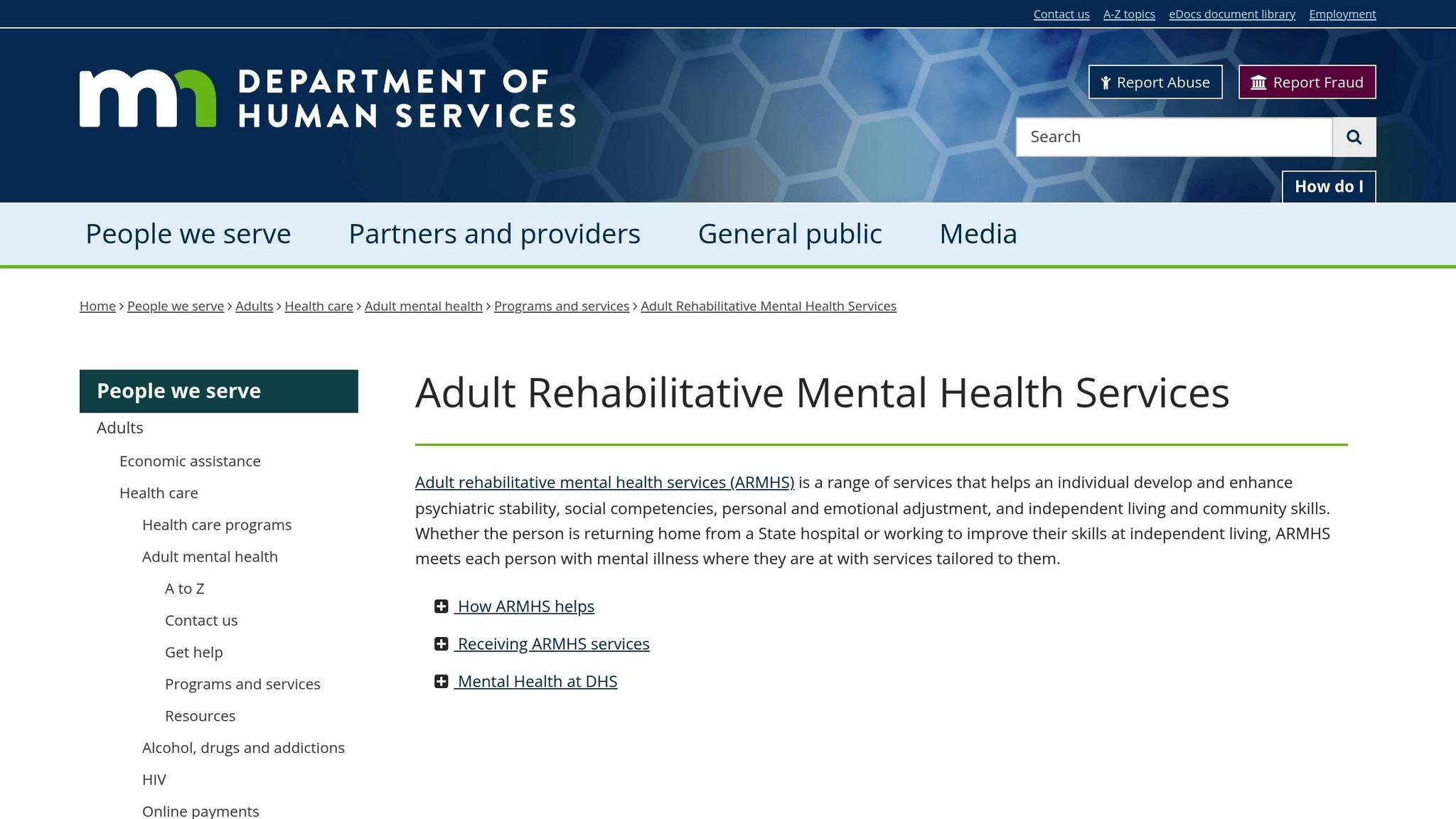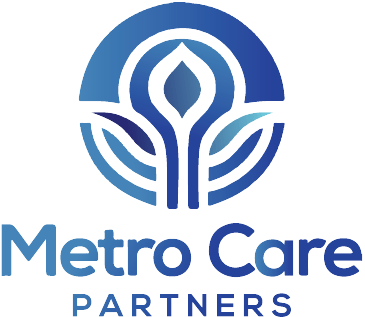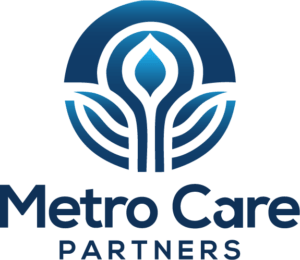Want better mental health outcomes? Start with culturally tailored care. Minnesota’s ARMHS (Adult Rehabilitative Mental Health Services) requires treatment plans that address cultural and linguistic needs. Why? Because aligning care with a client’s identity improves engagement, recovery, and community integration.
Key Takeaways:
- Cultural Identity Matters: Tailor plans to a client’s background, beliefs, and language preferences.
- State Guidelines: Treatment plans must document cultural needs, involve families, and provide language access.
- Action Steps for Providers:
- Conduct cultural assessments during intake.
- Incorporate traditional practices into care.
- Use interpreters and translated materials when needed.
- Overcoming Barriers: Address language gaps, stigma, and financial challenges with clear documentation and community partnerships.
By following these principles, providers can create treatment plans that resonate with Minnesota’s diverse communities while meeting state requirements.
Navigating Cultural Competence: Enhancing Mental Health Practice with Continuing Education
Core Principles of Responsive Care
ARMHS treatment planning emphasizes the importance of understanding how cultural factors influence mental health and recovery. This ensures that services are not only clinically effective but also resonate with the diverse backgrounds of individuals seeking care.
How Identity Shapes Mental Health
A person’s identity plays a significant role in shaping their mental health experiences and how they engage with treatment. Factors like cultural background, gender identity, religious beliefs, and other personal attributes create unique perspectives on mental health and the healing process.
Studies reveal that approaches tailored to cultural contexts lead to better client engagement and improved treatment outcomes. By integrating traditional healing practices alongside evidence-based methods, ARMHS providers can enhance the effectiveness of their care.
Identity impacts mental health in several ways, as shown in the table below:
| Identity Factor | Impact on Mental Health | Treatment Considerations |
|---|---|---|
| Cultural Background | Influences understanding of symptoms and healing | Incorporate cultural explanatory models |
| Religious Beliefs | Shapes coping mechanisms and support systems | Include spiritual practices when appropriate |
| Gender Identity | Affects access to treatment and social support | Address gender-specific barriers |
| Immigration Status | Introduces unique stressors and challenges | Factor in acculturation issues |
These insights align with state guidelines that emphasize culturally informed practices in ARMHS. Recognizing how identity influences mental health helps providers integrate these mandated practices in Minnesota.
Minnesota ARMHS Requirements

Minnesota has laid out clear guidelines to ensure culturally responsive treatment planning within ARMHS. These requirements aim to respect cultural differences while maintaining high clinical standards.
Key guidelines include:
- Individual Treatment Plans: Must address cultural and linguistic needs.
- Family Involvement: Should be culturally appropriate and respect the client’s preferences.
- Documentation: Providers must record how services address cultural concerns.
- Language Access: Ensure effective communication by providing language support when necessary.
Metro Care Partners meets these standards through detailed cultural assessments that shape individualized treatment plans. This ensures their services not only comply with state mandates but also cater to the unique needs of each client.
"The treatment planning process must include involvement of the client, their family, caregivers, or other people important to the client, including those authorized to consent to mental health services".
To successfully integrate cultural considerations into ARMHS, providers should:
- Be aware of their own cultural biases.
- Continuously educate themselves on cultural differences.
- Practice active listening to understand clients better.
- Adjust evidence-based practices to suit cultural contexts.
The Cultural Formulation Interview from the DSM-5 offers a structured way to evaluate cultural factors that influence mental health. This tool helps ARMHS providers systematically assess:
- Cultural identity.
- Explanations of illness.
- Cultural factors that influence coping strategies.
- Cultural elements in the provider-client relationship.
Creating Responsive Treatment Plans
To effectively address mental health needs, it’s essential to create treatment plans that reflect the client’s identity and cultural background. This includes integrating cultural assessments, setting personalized goals, and incorporating traditional practices. Metro Care Partners employs these strategies to deliver care that is both effective and culturally considerate.
Background Assessment Methods
A comprehensive cultural assessment is the foundation of a responsive treatment plan. It helps tailor the approach to the client’s unique experiences and needs.
Here are the key components to consider:
- Cultural Identity Evaluation
Gather details about the client’s cultural identity, such as:- Cultural markers and traditions
- Immigration history and level of acculturation
- Family dynamics and available support systems
- Community ties and access to resources
- Language and Communication
Understanding language preferences is critical for effective communication:- Identify the client’s preferred language for services
- Determine if an interpreter is needed
- Respect communication styles specific to the client’s culture
- Traditional Healing Background
Document the client’s experience with traditional healing, including:- Past interactions with traditional healers
- Cultural health beliefs and preferred practices
- Family or community healing traditions
These insights guide the development of personalized recovery goals.
Setting Client-Centered Goals
Metro Care Partners works closely with clients to define goals that are culturally aligned, clear, and measurable. The following table outlines key goal components:
| Goal Component | Cultural Considerations | Documentation Requirements |
|---|---|---|
| Vision of Recovery | Include cultural ideas of wellness | Record the client’s personal definition |
| Priority Areas | Reflect cultural values and beliefs | Specify relevant cultural factors |
| Timeline | Respect cultural views on healing | Set clear achievement dates |
| Support Systems | Identify community and cultural supports | Outline roles and responsibilities |
By incorporating these elements, treatment plans become more tailored and meaningful to each client.
Including Spiritual and Healing Practices
Integrating spiritual and traditional healing practices into treatment plans not only respects the client’s culture but also enhances the recovery process. Here’s how to approach this:
- Formal Documentation
Record traditional healing practices alongside clinical interventions:- Types of practices used
- Frequency and duration
- Expected outcomes
- How they align with clinical treatments
- Community Partnerships
Build relationships with cultural healers and spiritual leaders to support the client’s care:- Clarify the roles of traditional healers
- Develop coordination protocols
- Address safety considerations
- Establish methods for integrating these practices
Treatment plans should also accommodate cultural or spiritual observances. For example, appointments may need to be scheduled around religious events, or ceremonial elements might be included to support recovery goals.
ARMHS providers must ensure all documentation meets Minnesota’s requirements while respecting the client’s cultural preferences. Key records to maintain include:
- Findings from the cultural assessment
- Client preferences for traditional practices
- Strategies for integrating these practices
- Progress monitoring methods that honor cultural perspectives
Common Barriers and Solutions
Addressing challenges like language differences, mental health stigma, and payment issues is key to creating effective, culturally responsive ARMHS treatment plans. These barriers directly influence the success of individualized approaches tailored to diverse communities.
Language Access Solutions
Language barriers can significantly impact treatment outcomes. Metro Care Partners has developed a range of strategies to ensure clear and effective communication:
| Component | Strategy | Outcome |
|---|---|---|
| Interpreter Services | Certified interpreters available for all sessions | Ensures accurate communication of treatment details |
| Document Translation | Materials and treatment plans provided in the client’s preferred language | Improves understanding of care instructions |
| Staff Training | Programs focused on cultural communication skills | Enhances interactions between providers and clients |
Clients’ language preferences should be documented in their Individual Treatment Plan (ITP), and certified interpreters must be present during sessions to support clear communication.
In addition to language, addressing stigma within communities is critical for improving mental health outcomes.
Reducing Mental Health Stigma
Stigma surrounding mental health can vary across cultural groups, often discouraging individuals from seeking or continuing treatment.
Community Engagement
Building trust is essential. Metro Care Partners collaborates with local organizations to provide culturally tailored education and outreach programs. These initiatives aim to normalize discussions about mental health and reduce stigma in various communities.
Family-Centered Solutions
Involving families in the treatment process can help reduce feelings of isolation and foster supportive environments. Examples include:
- Family education sessions that align with cultural values
- Incorporating traditional healing practices into care plans
- Organizing support groups to connect families with shared experiences
"Metro Care Partners are dedicated to breaking down barriers to care. Our commitment to accessibility means that our personalized services are available to everyone in Minnesota, regardless of background or circumstance. By promoting inclusivity, we contribute to building healthier and more resilient communities." – Metro Care Partners
While addressing language and stigma barriers is vital, ensuring financial access to these services is equally important.
Payment for Specialized Services
Obtaining coverage for culturally specific services requires thorough and precise documentation.
Documentation Requirements
Treatment plans must establish the need for cultural accommodations by including:
- Findings from cultural assessments
- Specific language access needs
- Plans for integrating traditional healing methods
- Expected outcomes from the specialized services
Reimbursement Strategies
To secure funding:
- Clearly document cultural interventions in the ITP
- Show how specialized services align with recovery goals
- Track and report outcomes to justify ongoing care
- Record interpreter usage and its effectiveness
Consistent documentation, ongoing community involvement, and cultural awareness are all critical to overcoming these barriers. Regular evaluations allow providers to adapt and refine their approaches, ensuring the best possible care for clients.
sbb-itb-986d218
Measuring Treatment Plan Success
Tracking the success of treatment plans in multicultural ARMHS (Adult Rehabilitative Mental Health Services) involves a detailed approach that looks at both clinical outcomes and culturally relevant indicators. At Metro Care Partners, evaluations are designed to measure these aspects comprehensively, ensuring that both clinical progress and cultural alignment are taken into account.
Progress Measurement Methods
To assess how well treatment plans are working, Metro Care Partners uses a mix of standardized tools and culturally tailored metrics. Here’s a breakdown of the key methods:
| Assessment Type | Focus Areas | Tracking Approach |
|---|---|---|
| Functional Status | Skills for daily living, social interactions | Comparison of baseline and current performance |
| Cultural Outcomes | Community involvement, spiritual activities | Progress notes that reflect cultural context |
| Clinical Outcomes | Symptom management, crisis prevention | Standardized tools for consistent measurement |
Providers document both clinical improvements and cultural milestones. For example, they might note participation in cultural ceremonies, increased engagement with elders, or growth in spiritual well-being.
Client and Expert Input
In addition to measurable data, qualitative feedback plays a vital role in evaluating treatment plans. Metro Care Partners prioritizes collaboration to ensure plans remain effective and culturally appropriate.
How Client Feedback is Gathered:
- Regular check-ins conducted in the client’s preferred language
- Detailed documentation of preferences, concerns, and cultural needs
- Adjustments made based on input from clients and their families
- Consultations with cultural liaisons to refine care approaches
This feedback process also informs exit planning, ensuring that care remains aligned with the client’s cultural background even after services end.
"The ARMHS program at Metro Care Partners has been a game-changer for my mental health journey. The tailored support and genuine care from the mental health professionals have empowered me to develop essential skills and regain control over my life. I can’t thank Metro Care enough for their commitment to personalized mental health care." – Ali M., ARMHS Participant
Community-Based Exit Planning
Using the insights gained from progress measurements and feedback, Metro Care Partners creates exit strategies that ensure clients continue to receive culturally aligned support after their time in the ARMHS program. These strategies focus on building connections that sustain progress.
Key Elements of Exit Planning:
- Assessing ongoing cultural and linguistic needs
- Identifying resources within the community
- Establishing connections with cultural or spiritual organizations
- Integrating family and community support systems
The exit plan includes specific referrals and partnerships to maintain continuity of care. Examples include linking clients with:
- Cultural community centers
- Faith-based organizations
- Peer support groups
- Traditional healing practitioners
Key Points and Next Steps
Creating culturally responsive ARMHS treatment plans requires blending clinical expertise with a deep understanding of cultural contexts. This approach ensures that every plan meets both the clinical needs and cultural values of the client.
Key Components for Success
| Component | Key Actions | Expected Outcomes |
|---|---|---|
| Assessment | Understand cultural background and language preferences | Care tailored to the client’s values and needs |
| Engagement | Leverage family and community resources | Stronger client participation and support |
| Documentation | Track cultural preferences and progress | Better care continuity and goal achievement |
Steps for Implementation
- Conduct thorough cultural assessments during the intake process.
- Collaborate with cultural organizations and subject matter experts.
- Include cultural considerations in treatment plans.
- Regularly review outcomes using client feedback.
Culturally adapted interventions have been shown to increase engagement rates among minority groups by 30%. Metro Care Partners prioritizes ongoing training in cultural competence, which has led to better client outcomes and stronger connections with the community.
"The ARMHS program at Metro Care Partners has been a game-changer for my mental health journey. The tailored support and genuine care from the mental health professionals have empowered me to develop essential skills and regain control over my life. I can’t thank Metro Care enough for their commitment to personalized mental health care." – Ali M., ARMHS Participant
Looking Ahead
Providers should consistently document cultural considerations and measure the effectiveness of their services through client feedback and outcome analysis. Multicultural treatment planning is an evolving process that demands continuous learning and adaptability. By maintaining open communication with clients and their support networks, providers can deliver mental health care that is more aligned with each individual’s cultural and personal needs.
FAQs
How can providers integrate cultural and traditional practices into ARMHS treatment plans effectively?
To weave cultural and traditional practices into ARMHS treatment plans effectively, providers need to start by genuinely understanding each client’s unique background, values, and traditions. This means actively listening, asking thoughtful and respectful questions, and involving clients in every step of the planning process.
Providers can deepen their understanding by engaging in ongoing education and training focused on diverse cultures and traditions. Working closely with clients to identify strategies that resonate with their cultural identity – like incorporating traditional healing methods or tapping into community support networks – can make treatment plans feel more personalized and build stronger trust.
By fostering open communication and aligning services with each individual’s cultural identity, providers can design treatment plans that not only meet clinical goals but also honor and respect the client’s heritage and values.
How can language barriers be addressed to improve communication in multicultural treatment planning?
Breaking down language barriers in multicultural treatment settings is crucial for clear communication and tailored care. A great first step is to use professional interpreters or reliable translation services. These ensure that both providers and clients fully understand each other. Relying on family members for translation can sometimes lead to misunderstandings or create awkward situations, so it’s best avoided.
In addition, incorporating communication tools that align with cultural needs can make a big difference. This might include using visual aids, simplifying complex terms, or offering multilingual materials designed for the client’s specific background. Taking the time to actively listen and respect cultural differences not only builds trust but also strengthens collaboration when planning treatments.
How do cultural assessments during intake shape personalized treatment plans in ARMHS?
The Role of Cultural Assessments in ARMHS Intake
In Adult Rehabilitative Mental Health Services (ARMHS), cultural assessments during the intake process are key to creating personalized treatment plans. By taking the time to understand an individual’s cultural background, values, and beliefs, providers can craft care strategies that honor and integrate these aspects.
This approach goes beyond addressing mental health needs – it aligns treatment with the person’s cultural identity. The result? Increased trust, stronger engagement, and improved outcomes. Acknowledging cultural factors also helps tackle potential obstacles, paving the way for more effective recovery and smoother integration into the community.

